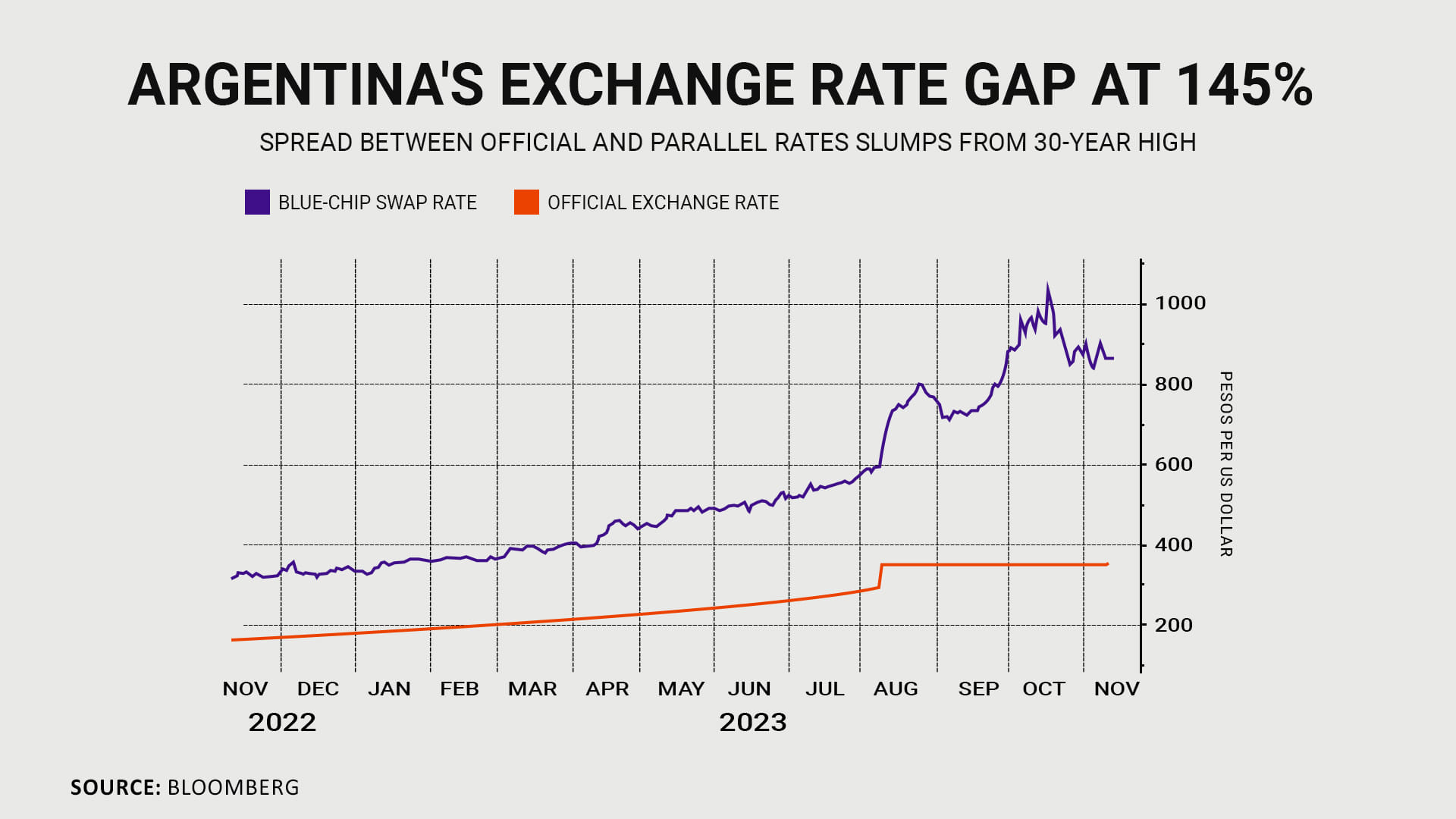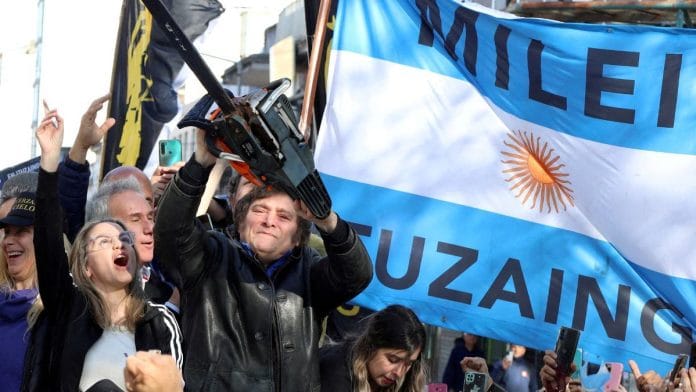Argentina, where voting is mandatory for those eligible, has elected a new president: Javier Milei. The 53-year-old leader of the coalition La Libertad Avanza (Liberty Advance) will take office on 10 December.
The system in Argentina involves two rounds of polling. In the first round in October, incumbent Economy Minister Sergio Massa came out on top with two others including Milei trailing him. But in the second-round runoff, the conservatives who came in third endorsed Milei and his vote percentage (56 percent) surpassed that of Massa’s (44 percent).
An author, economist and populist — in more ways than one — Milei rose to stardom as a rabble-rouser TV panellist, railing against the system and declaring the State an oppressive institution.
His election as president comes at a time when about 40 percent of Argentines are living below the poverty line (according to the country’s definition of poverty). At the same time, this country of nearly 4.6 crore people has a per capita income of $13,700 per year — five times higher than that of India’s. Yet, Argentina has enormous economic problems.
Milei captured this distrust of the State and used it to his advantage, even carrying a chainsaw on the campaign trail to signal the need for radical economic and governmental reform. He promised to cut the government to size and to slash government spending by 15 percent of GDP.

As far as domestic policy is concerned, he wants to loosen gun laws, shrink the size of government and ban abortion. He even once referred to Pope Francis, who is of Argentine origin, as a “filthy Leftist”.
A genuine libertarian, Milei doesn’t believe in ‘Big government’ and has described himself as an anarcho-capitalist. He believes Climate Change is a “socialist lie” and detests socialism to the extent that he has vowed to cut Argentina’s ties with Brazil and China after coming to power.
Another reason why we in India must pay attention to what’s happening in Latin America is because China has massive investments there. The Chinese have surplus cash and go wherever they find minerals or rare-earth elements — used in the production of electric vehicles. For instance, located west of Argentina, Chile has the world’s largest reserves of lithium. To the north, Bolivia too has lithium in plenty and so does Argentina.
Besides these, Argentina grows something the Chinese hold dear: soybeans. The country is among the largest exporters of soybeans.
Interestingly, the Chinese had been supporting the candidature of Sergio Massa and Milei was never shy of calling it out, even accusing Beijing of interfering in Argentina’s internal affairs. This is all the more reason to see his election as a sizable setback for China’s interests in Latin America.
Milei has vowed to cancel all government-to-government deals with China that lack transparency.

What we also need to understand is that Javier Milei is not a conventional politician. He was an economist of the Austrian school.
Milei has also declared his intention to pull Argentina out of Mercosur — a South American trading alliance which counts Argentina, Brazil, Paraguay and Uruguay as members, and Bolivia, Chile, Colombia, Ecuador, Guyana, Peru, Suriname as ‘associate states’. Venezuela too was a permanent member of this grouping until its suspension in 2016.
Mercosur member states have been working to secure an FTA (free trade agreement) with the European Union, but Milei’s election puts that in jeopardy.
Also read: Origins of US-Israel ties & why this enclave has been vital to Western interests in Middle East
Argentina’s downward economic spiral
Argentina is witnessing an annual inflation of 145 percent. Its currency, the Argentine peso, is declining so rapidly that the outgoing government set a rate of depreciation of 3 percent each month for it. That’s because there is no relation anymore between the value of the peso and its market price.
Officially, the peso is 354 to a US dollar. But it also has a ‘blue chip’ rate, a ‘blue’ rate, a ‘tourist’ rate, a ‘luxury’ rate and a ‘tech incentives’ rate.

The ‘blue chip’ rate, for instance, is 844 peso to a dollar. This is the exchange rate an Argentine gets if he/she has to buy international bonds, shares, gold or any other internationally traded commodity. Similarly, the ‘blue’ rate is the exchange rate one might get on the street.
The ‘tourist’ rate is roughly double the official rate of exchange at any given time, which is also the case for the ‘luxury’ rate which one gets in order to buy private jets, sports cars, yachts, premium watches etc.
Then there is the ‘tech incentive’ rate of exchange for companies that export tech. This allows them to retain 30 percent of the US dollars they earn on their export, while the rest goes to the banking system.
To add to that, Argentina’s central bank is out of foreign currency and cannot service its debt since whatever foreign currency it has cannot be used for that purpose.
As a result, Argentina is now trying to secure its 22nd IMF bailout.
That’s how messed up Argentina’s economy is and it’s mostly a result of populism and an ‘unprecedented’ drought that devastated the country’s agricultural exports and a sizable part of its economy.

This is also where the Chinese come in. On 18 October, the eve of the first round of the Argentine presidential election, Beijing allowed Buenos Aires to tap the central bank swap line between the two countries for $6.5 billion, which allowed Argentina to avoid an IMF default.
The Chinese set up the first such swap line with Argentina in 2009 and then it became like a perpetual debt to finance fiscal indiscipline. The Chinese were probably investing because they knew they were going to buy lithium, soybeans or shale gas — which Argentina has a lot — against it.
By May 2023, the Chinese had set up similar central bank swap lines with as many as 40 countries, giving out 4 trillion renminbi (yuan).
Argentina is also a partner in China’s BRI.
Javier Milei, however, has stated his intention to cut ties with China, dollarise the Argentine economy and dismantle the country’s central bank.
Also read: Who are Houthis, why Iran is arming them & what this means for Israel
How Right & Left reacted
Also interesting to note is how leaders of the Right reacted to Milei’s election. Former Brazilian president Jair Bolsonaro congratulated him and former US president Donal Trump said he was proud of the Argentine politician. “You will turn your country around and truly Make Argentina Great Again!” Trump wrote on his Truth social platform.

Brazilian President Luiz Inácio Lula da Silva was careful in his reactions and said he looked forward to working with Milei. Leftist Gustavo Petro, the president of Colombia, did not mince words and termed the outcome of the Argentine presidential election a “sad day” for Latin America.
This is the edited transcript of ThePrint Cut The Clutter Episode 1350, published on 20 November 2023, on the election of Javier Milei as Argentina’s President-elect and what it means for the Argentine economy, Latin America and China.
Also read: Synthetic drug ‘50 times more potent than heroin’ — why fentanyl figured in Biden-Xi meet






